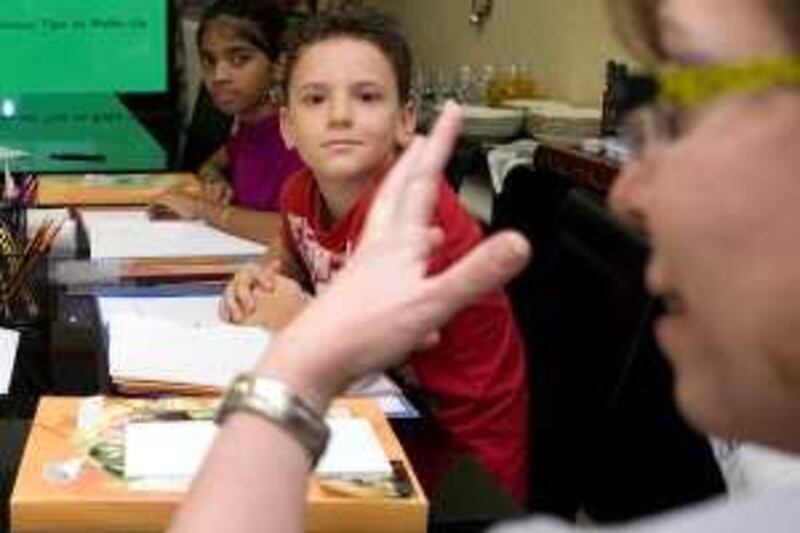DUBAI // The table is set for dinner. The cutlery and crockery are gleaming, the napkins and placemats impeccable and the food is arriving for the "guests" to try. It is all a bit bewildering for nine-year-old Edward Smit, who seems unsure of what exactly is the correct way to eat bundled baby romaine with marinated palm hearts. Then there is the conundrum of how to devour warm asparagus with caviar and marinated salmon with a lime butter sauce without disgracing himself.
Welcome to Finishing Touch - The Academy of International Etiquette and Savoir-Vivre, where youngsters between eight and 14 are taken through the art of perfect table manners and taught to conduct themselves with grace and elegance at formal occasions. "It's OK to eat asparagus with your fingers unless it has sauce on it - then you have to use cutlery," says Edward, in a burst of inspiration. "Bravo! Such a clever little man," responds Nour Roumieh, a teacher at the academy.
While most of Edward's peers are enjoying the long sunshine-filled break from school, splashing in pools or playing football, he has spent the past fortnight cooped up in a classroom, learning how to mind his Ps and Qs. Lessons in etiquette, once popular with the middle classes but latterly out of fashion, are making a comeback, and the past decade has seen a steady rise, notably in America but elsewhere too, in the number of courses offering to instil social graces in both children and adults.
At the forefront in the UAE is the Finishing Touch school in Dubai's Knowledge Village, which offers to transform awkward youngsters and teenagers into polished, well-spoken young men and women, capable of making small talk at the dinner table and separating their escargots from their escalopes. The school's youth etiquette course covers basics such as personal grooming, how to greet strangers, table manners, giving the perfect party and - a sign of the changing times - mobile phone etiquette, including such principles as turning the devices off in meetings.
No matter that some of her charges are as young as eight - Ms Roumieh says these are "essential leadership skills" that will help them later. "What they are learning is not just manners, it is meant to become part of their nature," she says. "It is not just about being polite, it is about how to communicate with ease, how to enjoy conversation and how to eat food properly. It gives them self-confidence.
"When children leave me, they are ready to face the public and are prepared to go to university and live alone. It gives them wings." And Ms Roumieh says the younger, the better. "Everything you learn in childhood is imprinted and stamped in your nature for life, it is building a foundation. I have had parents of five-year-olds calling asking for my help, but anyone younger than eight is too young to sit through hours in class," she says.
Her summer camp disciples this week include Edward, his sisters Denise, 12, and Elmari, 14, and 11-year-old Bhrindha Kummar. Among the challenges posed are what to do when a bread basket is placed in front of you (the answer is pass it to the right), how to debone a fish fillet and eat soup that is too hot without slurping. Cooling it down by grabbing ice cubes from the water jug is simply not the done thing, apparently.
They also learn how to set a table, use snail tongs and what not to talk about. With politics, religion, finance and personal questions ruled out, the only safe dinner party topics are social activities such as going to the cinema, says Ms Roumieh. Cynics might argue that such skills are wasted on the young and could even force them to grow up too quickly. But Syrian-born Ms Roumieh says in a multicultural place like the UAE, etiquette is a universal language which crosses linguistic divides. "Globalisation has meant different nationalities discovering how difficult it is to understand each other - but everyone understands good manners.
"We do not want to change the nature of children, but if you imprint these lessons on their minds, they will be there for life." Only once has she refused to teach children who were deemed too unruly to learn good manners. The Smits were put forward for the course by their mother Helga. Denise says: "She thought it was time we started going out to proper dinner parties and expensive restaurants and knew how to behave properly."
Edward adds: "I used to lean elbows on the table and use toothpicks in public but have learnt those things are kind of indecent. My mum said my manners have improved a lot." Youth etiquette is just one element of Finishing Touch, which also runs programmes for expatriates dealing with local people as well as corporate and social etiquette. Since she cofounded the school three years ago, Ms Roumieh has seen its popularity growing among Arabs, particularly Emiratis.
"They travel a lot and everyone is interested in refinement," she says. "Etiquette classes were considered old-fashioned from the 1960s to the late 1980s but now that people are looking for sophistication, they are coming back into fashion." For more information visit www.finishingtouch.ae or call 04 4272452. tyaqoob@thenational.ae






